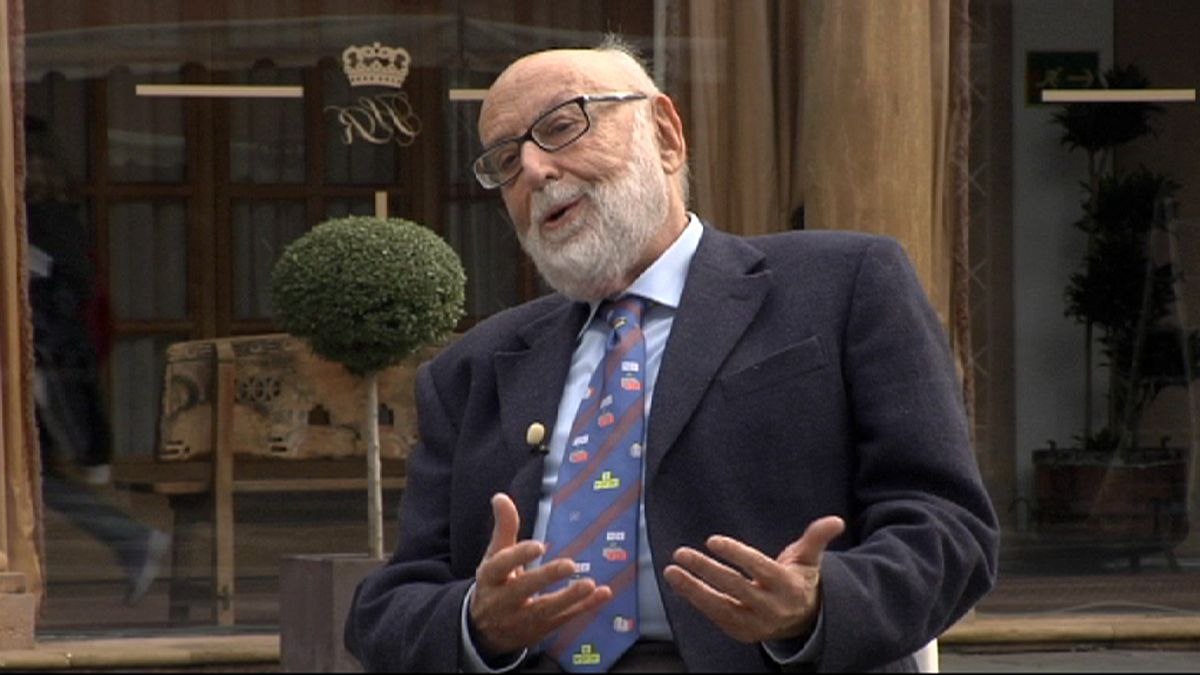Following the discovery of the Higgs boson, this year’s Nobel prize for physics – as expected – went to the two men who first came up with the theory half a century ago: François Englert of Belgium and Britain’s Peter Higgs.
Euronews met Englert to ask him about this long-awaited recognition, the future of physics, and God.
Lise Pedersen, euronews: “Professor, what does it feel like to see your name come up next to those of Albert Einstein and Pierre and Marie Curie?”
François Englert: “Modest, first of all, because I’m nowhere near Einstein’s intelligence and understanding. He is one of the two or three people who have changed the world’s comprehension in a way which no one, in my opinion, has equalled, and certainly not me. That said, evidently it is rather nice to receive this recognition.”
euronews: “You’ve received numerous prizes, the biggest being the Nobel. Shouldn’t the Large Hadron Collider have been the third laureate?”
Englert: “I’m not part of the prize committee, so it’s not for me to discuss the underpinning of what the Nobel Prize decision-makers do. Clearly, the committee chose to reward the discovery of the theory; right or wrong is not up to me to say.”
euronews: “Would you say that thanks to the particle accelerator tool Europe has the means to be a world leader in scientific research, ahead of the United States?”
Englert: “It’s obvious, at least in experimental research development for particle physics. I wouldn’t go so far as to say it’s true generally, but here, it’s clear that CERN today is unsurpassed anywhere in the world, it’s truly the nec plus ultra now, in experimental research into elementary particles.”
euronews: “The Higgs boson has been described as the most important scientific discovery in the last 50 years. Now that the missing piece of the Standard Model puzzle has been found, what are the major challenges facing scientific researchers in the coming years?”
Englert: “There might be an even bigger problem, because it calls into question fundamental developments that physics has to achieve if it wants to deepen knowledge further as regards to looking into the scientific intelligibility of the universe – what we call dark energy. That’s not the same thing as dark matter. It’s a field that envelops the whole universe and which stretches out with it. This thing, of course, has phenomenological explanations that Einstein already found, but deeper comprehension probably calls for knowing the effects of quantum mechanics, or, more precisely, the relationship between quantum mechanics and the theory of relativity, which is the theory of the gravitation of bodies. All things together, it’s not very important to what surrounds us; the quantum effects of gravitation are negligible, but they play a fundamental role in the emergence of the universe from I don’t know what – and that’s what we have to find.”
euronews: “Without quantum physics there wouldn’t be any science fiction, there wouldn’t be Star Trek. If you hadn’t been daring enough to publish this article 50 years ago, there might not have been a theory to prove. How much imagination and creativity is there in what you do?”
Englert: “I think there really is creativity, and I’d say, basically, that what you need is new ideas, and that if we want to come up with ideas it requires what we call in a rather banal way ‘intuition’. But intuition is about things that come from experiments that have been put into the world of the unconscious or the subconscious, and in which things are done more freely than in the world that is governed by daily necessities. And it’s this analysis – keeping this up to date – that plays a very important role in what we commonly call intuition, but which actually is a creative phenomenon. That I believe is essential. I think that it’s not essentially very different from artistic creation. In a way aesthetics plays a fundamental role.”
euronews: “When your article was published 50 years ago, it didn’t arouse much interest. What message do you have for young researchers?”
Englert: “A message… I don’t think there really is a message to give. I can only recount my experience. Things in that time led us to make this theoretical discovery – Robert Brout and me. It was basically because we had worked in another area. We had always tried to revive the humanist ideal, somewhat. But that’s harder in a world where there is so much knowledge that we get the impression we can’t know everything, but we can still have ideas, especially if we do it intelligently. I believe that. It’s clear also that when starting out in a domain in which you have little experience – which not only carries disadvantages but some advantages – don’t make the same mistakes as others.”
euronews: “The Higgs boson has been nicknamed ‘the God particle’ by the media. What does God have to do in all of this?”
Englert: “Nothing, nothing! It’s simple: I don’t think God has anything to do with it. What’s more, I don’t very well see what God has to do with anything, but that’s a separate question.”


